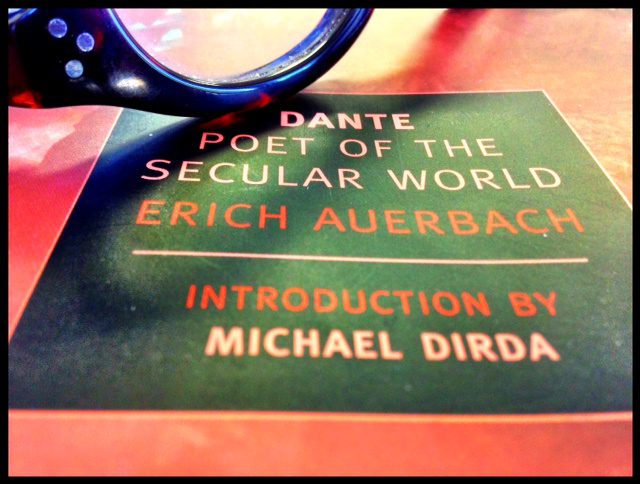You Must Be A Dramatic Hero
 I’m reading Erich Auerbach’s well-known book Dante: Poet Of The Secular World. It’s a small book, and a dense one, but it is deeply rewarding preparation for the book I’ve started writing. Here’s Auerbach on how Dante gave flesh and blood, so to speak, to Scholasticism by incarnating it into poetry. Auerbach says that a century before Dante wrote, Aquinas
I’m reading Erich Auerbach’s well-known book Dante: Poet Of The Secular World. It’s a small book, and a dense one, but it is deeply rewarding preparation for the book I’ve started writing. Here’s Auerbach on how Dante gave flesh and blood, so to speak, to Scholasticism by incarnating it into poetry. Auerbach says that a century before Dante wrote, Aquinas
… had achieved an organic, systematic order. It employs the method of listing and classifying, beginning with God and going on to deal with the creatures who have issued from Him. It is a didactic system, which, in accordance with its purposes, treats of it subject as in being and at rest. Dante transforms Being into experience; he makes the world come into being by exploring it; Wisdom sets creative powers in motion and becomes a poetic figure. Dante starts out with a man who has lost his way. Reason — not Aristotle, but Virgil — is sent to help him and leads him to the revealed truth, which enables him to see God. Thus, by reversing the order of the Summa, Dante discloses divine truth as human destiny, as the element of Being in the consciousness of erring man, who participates only inadequately in divine Being and is in need of completion and fulfillment. In that human mind Being takes on a character of tension as though it were a force in process of becoming. In the vast edifice of the world through which he journeys, Dante is the only personage to whom it has not yet been interpreted, either in its self-contained reality or in its relevance to himself. The pathos experienced at each station of the way concerns him personally, for each station is potentially a part of his own ultimate destiny.
These very general remarks are intended only to define and circumscribe the dynamic element in the poem; to recall that God is at rest, that His Creation moves along eternally determined, unalterable paths, while man alone must seek his decision in uncertainty; in the order of his poem Dante embodied the dramatic content of the doctrine, grounded in the Christian history of salvation and theoretically formulated by St. Thomas — a doctrine fundamental to European culture. Man alone but man in every case, regardless of his earthly situation, is and must be a dramatic hero.
To immerse oneself in the existential drama of The Divine Comedy is to confront one’s own destiny, and, to put a fine point on it, one’s responsibility for one’s own destiny. Our lives here on earth are always a matter of becoming. Who, and what, we are becoming — well, that’s up to us. The Divine Comedy makes it clear that we will be held responsible for how we chose. Our character is made up of all the choices we have made in time, and character is destiny. The damned are who they chose to be, forever.
Say, just a reminder: next week, on Ash Wednesday, we will begin discussing the Purgatorio — one canto per day, throughout Lent. On Monday, when Orthodox Lent starts, I will begin with some background remarks about the Commedia, and the Inferno — information that will prepare us to start the Purgatorio. I hope that we have a number of you readers participating in the discussion. Pick up your copy of Purgatorio now, if you haven’t already. It’s not strictly necessary that you will have read the Inferno to go with us on the climb up Mount Purgatory, but it will help.

Subscribe for as little as $5/mo to start commenting on Rod’s blog.